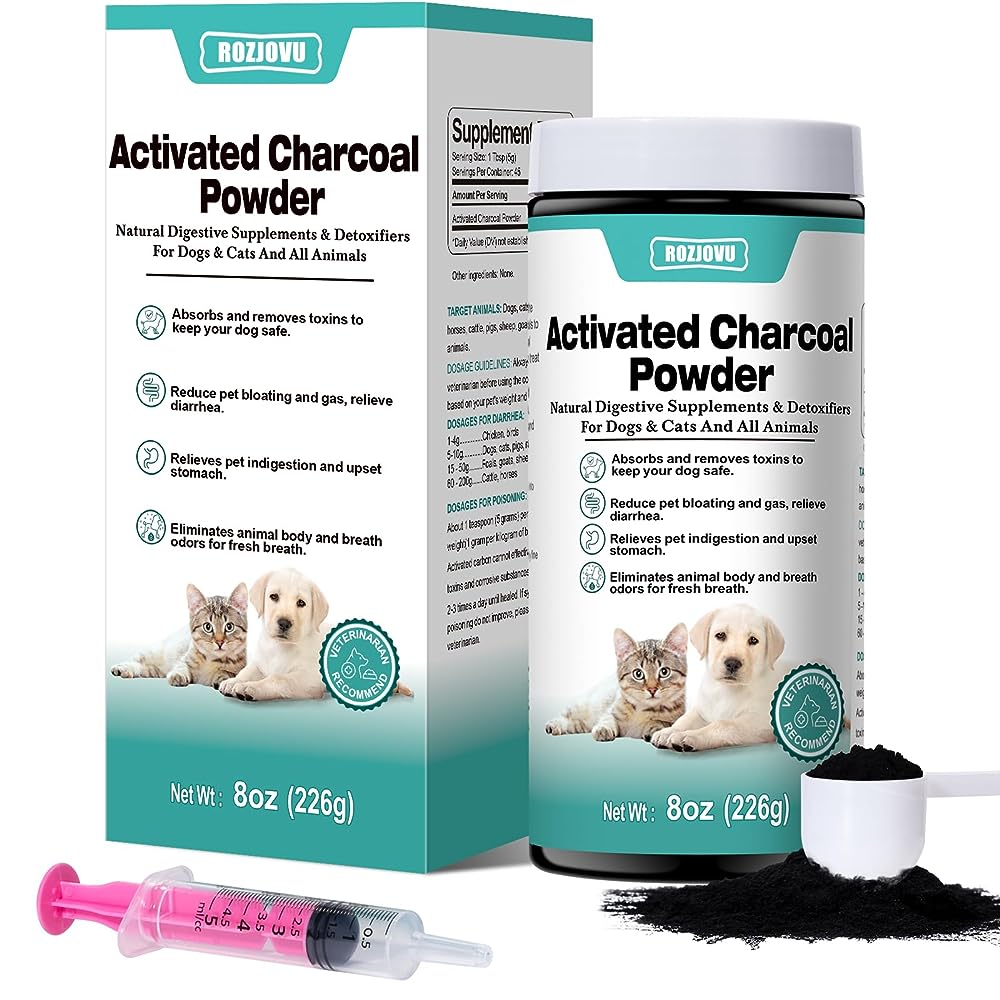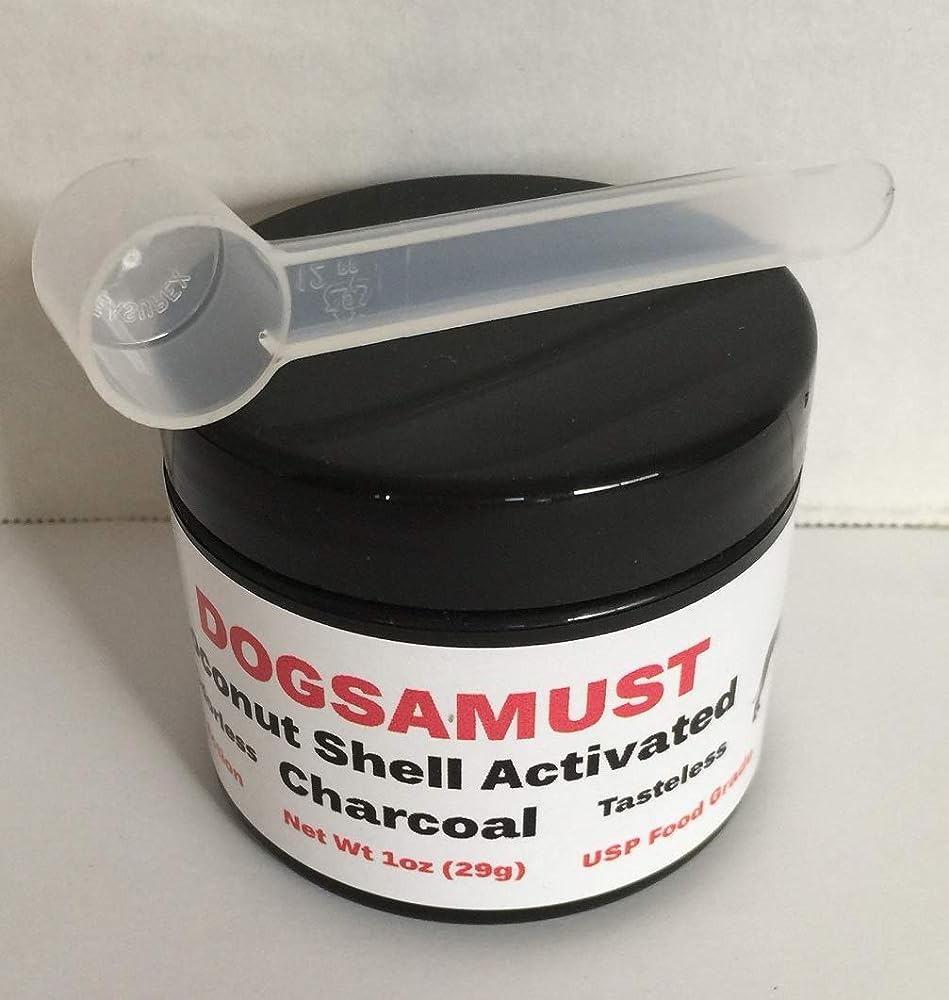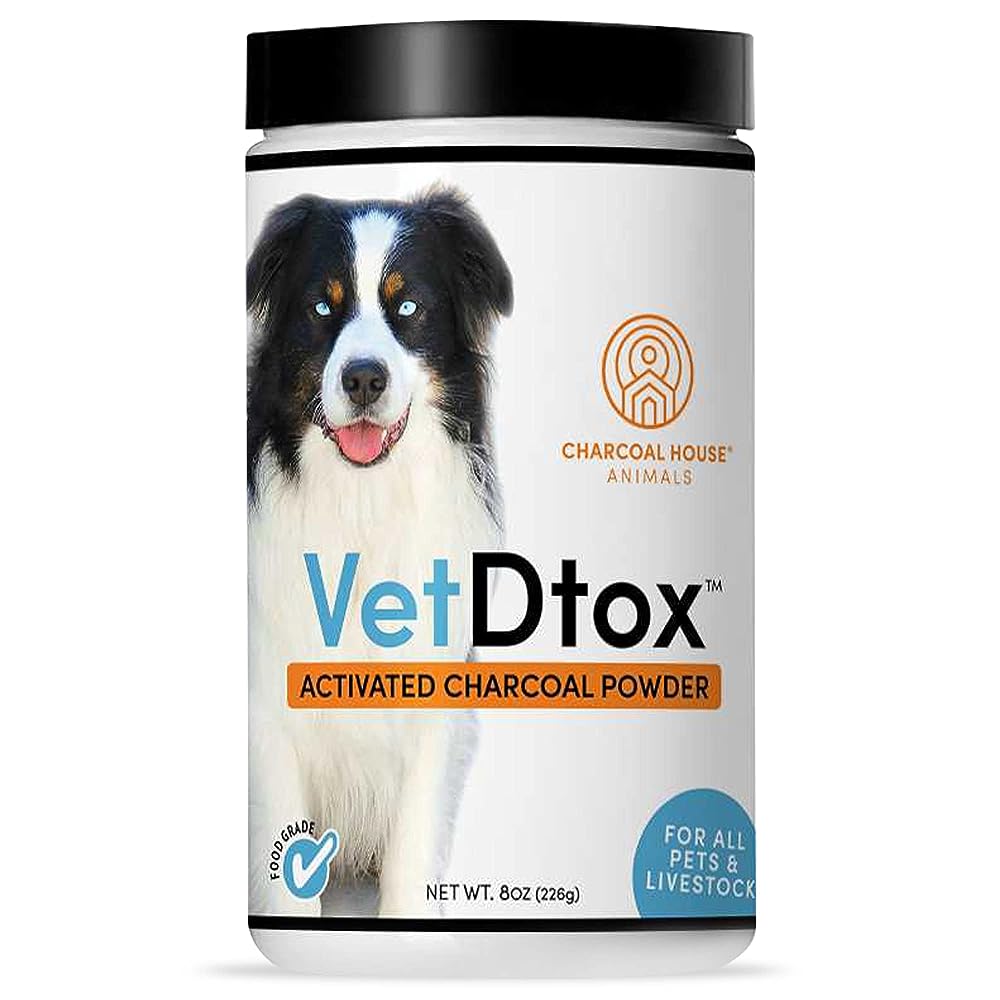iHeartDogs is reader supported. Some of the links below may be paid affiliate links, where we receive a small commission on a product at no additional cost to you.
As pet parents, we’re always seeking the best health solutions for our furry friends, and activated charcoal has risen as a popular, natural remedy for various canine issues. From toxin absorption in emergency situations to digestive support, this versatile substance offers numerous benefits. In this article, we will explore some of the best-activated charcoal options for dogs, discussing their effectiveness, safety, and how to choose the most suitable product for your four-legged companion.
#1 – VetDtox 1qt Activated Charcoal Powder for All Kinds of Pets & Livestock, Dog, Cat, Chicken, Horses and More – for Diarrhea, Gas Relief, Liver Support
VetDtox 1qt Activated Charcoal Powder is a natural and vegetable-based product designed to help with common stomach issues in pets and livestock. It is safe to administer orally by mixing it into their feed, water, or milk, making it easy to use. Trusted in Europe, this activated charcoal is commonly used in animal feeds to control food poisoning and diarrhea, and it has the added benefit of naturally controlling animal odors.
#2 – Activated Charcoal for Dogs, Cats, and All Pets, Pet First Aid Kit Antidote for Poisoning, Indigestion & Diarrhea, Gas Relief, 8 oz (Powder)
Activated Charcoal for Dogs, Cats, and All Pets is a powdered supplement that can be used to aid in the treatment of poisonings, indigestion, diarrhea, and gas relief in pets. Made from 100% sustainable hardwood, this activated charcoal is natural food grade and safe for pregnant and lactating animals. The powder can be easily mixed with food or water for oral administration, and it can also be used topically for injuries. Additionally, it can be used to enhance oral hygiene and freshen breath in pets.

#3 – DOGSAMUST All Natural Coconut Shell Activated Charcoal for Dogs 1 oz Powder
The DOGSAMUST All Natural Coconut Shell Activated Charcoal is a 1 oz powder that is specifically designed for dogs. It is odorless and tasteless, making it easier to administer to dogs without any resistance. The product claims to have fast action, effectively purging the body of toxins. It is also USP food grade and safe to use on pregnant or lactating dogs with no reported side effects.

#4 – Fetch A Vet Activated Charcoal Gel 60ml EZ Dose Bottle (1-Pack) Pet Emergency First Aid Poison Antidote Treatment
The Fetch A Vet Activated Charcoal Gel is a pet emergency first aid product designed to treat ingested poisons. This gel, made in the USA, is a universal oral antidote that adsorbs toxins and protects and soothes the pet’s gastrointestinal tract. The concentrated gel is easy to use with its EZ Dose Bottle, allowing pet owners to quickly administer the treatment without the need to measure the dosage.

What Are The Benefits of Using Activated Charcoal for Dogs? When Should I Call a Vet?
Activated charcoal for dogs offers a number of potential health benefits. The primary function of activated charcoal is its ability to absorb toxins, which is why it’s often used in cases of accidental ingestion of harmful substances. It can help prevent the absorption of these substances in the stomach and intestines, and facilitate their removal from the body.
However, it’s crucial to understand that activated charcoal should only be administered under the direction of a veterinarian. If you suspect your dog has ingested a potentially toxic substance, it’s vital to call your vet or a pet poison control center immediately. They will guide you on the best course of action based on the specific circumstances, including whether or not activated charcoal should be administered.
In addition to emergency situations, activated charcoal can be used to support your dog’s digestive health, as it can help absorb gas and alleviate bloating, and also remove impurities from the water.
Remember, any new health concern, sudden change in behavior, signs of discomfort, or if your dog stops eating or drinking, warrants a call to the vet. The same applies if your dog shows any adverse reactions after taking activated charcoal. It’s always better to be safe and get your furry friend checked out.
Frequently Asked Questions About Activated Charcoal for Dogs
- What is activated charcoal for dogs? Activated charcoal is a fine, odorless, black powder often used in emergency situations to treat dogs that have ingested toxins. It works by trapping toxins and chemicals, preventing their absorption in the gut.
- When should I use activated charcoal for my dog? Activated charcoal is typically used when a dog has ingested a toxic substance, such as certain human foods, medications, or poisonous plants. Always consult your vet before administering activated charcoal.
- How does activated charcoal work in dogs? Activated charcoal works by absorbing toxins in the dog’s stomach and intestines, preventing them from being absorbed into the body. It essentially acts as a sponge, trapping harmful substances and helping to expel them from the body.
- Is activated charcoal safe for my dog? When used properly and under the supervision of a veterinarian, activated charcoal can be safe for dogs. However, it can cause side effects like vomiting, diarrhea, and constipation, and it should not be used if your dog has certain conditions or is on specific medications.
- Can I use human activated charcoal for my dog? While the activated charcoal itself is the same, human and dog dosages can be quite different. Therefore, you should only use activated charcoal for dogs as advised by a vet.
- How do I administer activated charcoal to my dog? Activated charcoal is typically given orally, either as a powder mixed with water or as a pre-packaged liquid. However, it can be messy and difficult to administer, so it’s usually best done by a vet.
- What are the side effects of activated charcoal in dogs? Potential side effects can include vomiting, diarrhea, constipation, or black stools. If these side effects are severe or persist, contact your vet immediately.
- Can activated charcoal be used for anything other than toxin ingestion? Activated charcoal can also be used for digestive health issues such as bloating and gas, as it can absorb gases in the digestive system. However, it should only be used in these cases under the advice of a vet.
- Does activated charcoal replace the need for veterinary care? No, activated charcoal does not replace the need for veterinary care. If your dog has ingested a harmful substance, it’s important to seek immediate veterinary attention. Activated charcoal is often part of the treatment plan but not the sole solution.
- What should I do if I think my dog needs activated charcoal? If you suspect your dog has ingested a toxin, contact your vet or a pet poison control center immediately. Don’t administer activated charcoal without guidance from a professional, as it may not always be the appropriate treatment.
Conclusion: Best Activated Charcoal for Dogs
As we’ve explored, activated charcoal can be a valuable tool in managing your dog’s health, particularly in emergency detoxification situations or for supporting gut health. However, it’s critical to remember that not all activated charcoal products are created equal. When choosing the best-activated charcoal for your dog, consider its source, purity, and the brand’s reputation. Most importantly, always consult with your vet before introducing any new supplements to your pet’s routine. The wellness of our pets is our utmost priority, and informed, careful decisions are the key to ensuring their long-term health.
iHeartDogs is reader supported. Some of the links below may be paid affiliate links, where we receive a small commission on a product at no additional cost to you.

 Toledo, United States.
Toledo, United States.